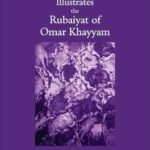Omar Khayyam’s Ruba’iyat and Rumi’s Masnavi Interpreted. The Politics and Scholarship of Translating Persian Poetry. Amir Theilhaber.
In: Friedrich Rosen. Orientalist Scholarship and International Politics. Berlin, Munich, Boston: De Gruyter Oldenbourg, 2020. viii, 627 pp. ISBN: 978-3-11-063925-4.
Also available as Open Access document.
Archives
Edward FitzGerald’s Translation of The Rubáiyát of Omar Khayyám
Edward FitzGerald’s Translation of The Rubáiyát of Omar Khayyám: The Appeal of Terse Hedonism. Asghar Seyed-Gohrab
In: Seigneurie (Ed.) 2020 – A Companion to World Literature, Volume 4: 1771 to 1919.
Omar Khayyam’s Transgressive Ethics and Their Socio-Political Implications in Contemporary Iran
Omar Khayyam’s Transgressive Ethics and Their Socio-Political Implications in Contemporary Iran. A.A. Seyed-Gohrab.
In: Iran Namag, Vol. 5, no. 3 (Fall 2020).
Summary:
In this paper, the author examines several social implications of Khayyam’s poetry and the reception history of the Persian sage (hakim) Omar Khayyam, who has become a personification of transgressive ideas in Persian literary history. The fascination of the author is due not only to Khayyam’s poetic genius (although he is not the author of the majority of quatrains attributed to him), but also to his problematic reception in twentieth-century Iran and how he has been connected to the notion of modernity. Both religious and secular intellectuals have tried to position Khayyam in the modern intellectual history of Iran in their own ways.
Rubaiyat of Omar Khayyam
Rubaiyat of Omar Khayyam
In: Taher-Kermani (Ed.) 2021 – The Persian Presence in Victorian. Edinburgh : Edinburgh University Press, 2021. ISBN: 9781474448161. Pp. 146–173
Summary:
Omar Khayyám is known in Persian literary history as the supreme exponent of the rubáiy (pl. rubáiyát), a short verse from consisting of a single stanza, rhyming aaba. The extent of Khayyám’s fame, however, goes beyond the geographical or cultural boundaries of his place of origin. Thanks to Edward FitzGerald’s translation, Khayyám is now celebrated globally, not just as one of Persia’s classical poets, but as a learned philosopher who, in a collection of epigrammatic poems, has encapsulated some of the largest and most enduring preoccupations of humankind.
Absurdity and Metaphysical Rebellion in the Philosophies of Albert Camus and Omar Khayyam
Absurdity and Metaphysical Rebellion in the Philosophies of Albert Camus and Omar Khayyam. Lynn Alsatie. Indianapolis : Butler University, 2019. Undergraduate Honors Thesis.
Orlando Greenwood illustrates the Rubaiyat of Omar Khayyam
Orlando Greenwood illustrates the Rubaiyat of Omar Khayyam. Danton O’Day. [S.l.], Blurb, 2021. [48 p.] 9 illustrations ; 23 x 15 cm. ISBN: 9781034492504.
Orlando Greenwood (1892-1989) was a brilliant, talented artist, who already at the age of 21-22 felt strongly attracted by the verses of Omar Khayyám. His illustrations to the Rubáiyát were recently discovered and presented in this book by Danton O’Day for the first time. The nine illustrations are included in the text of FitzGerald’s first version.
The Study of Rubaiyat attributed to Khayyam in Movies
The Study of Rubaiyat attributed to Khayyam in Movies. Milad Minakar, Amir Hossein Chitsazian.
In: CINEJ Cinema Journal, Vol. 8, no. 2 (2020), p. 324-352.
